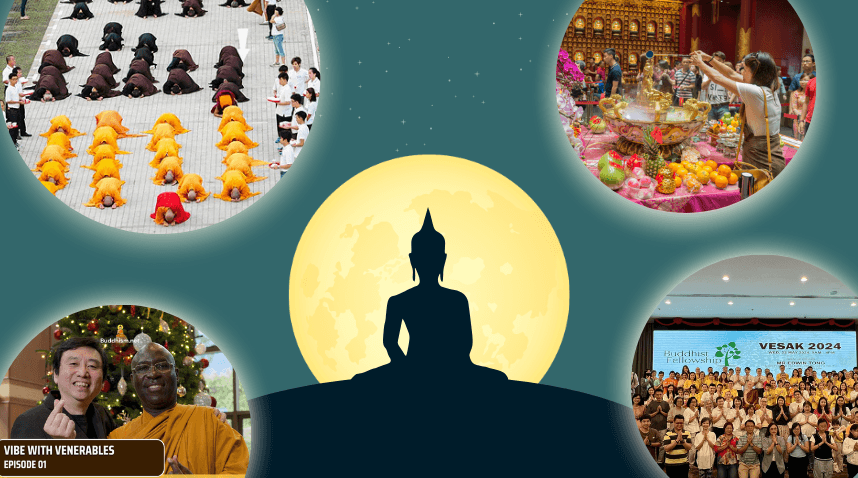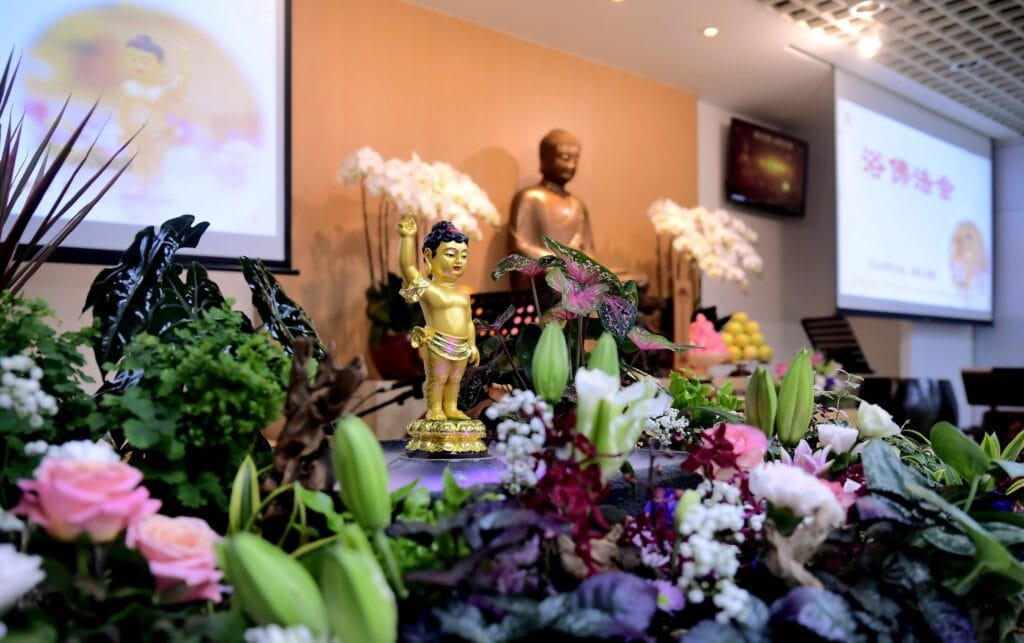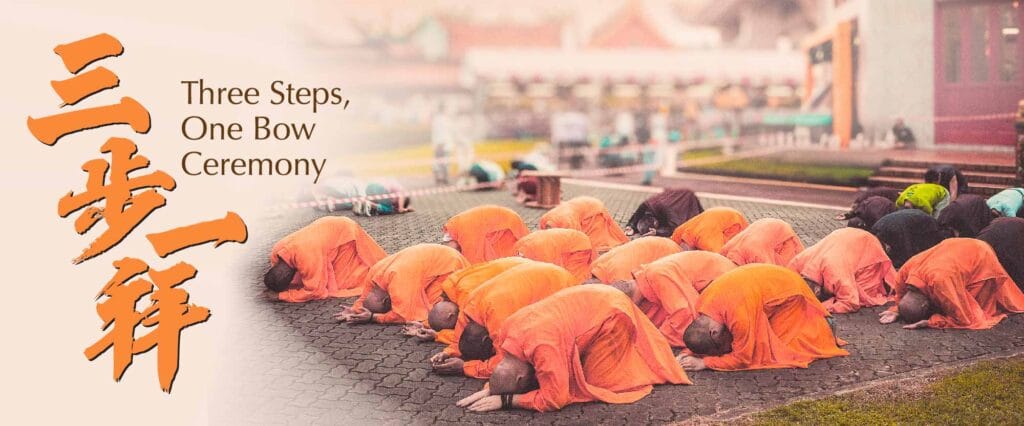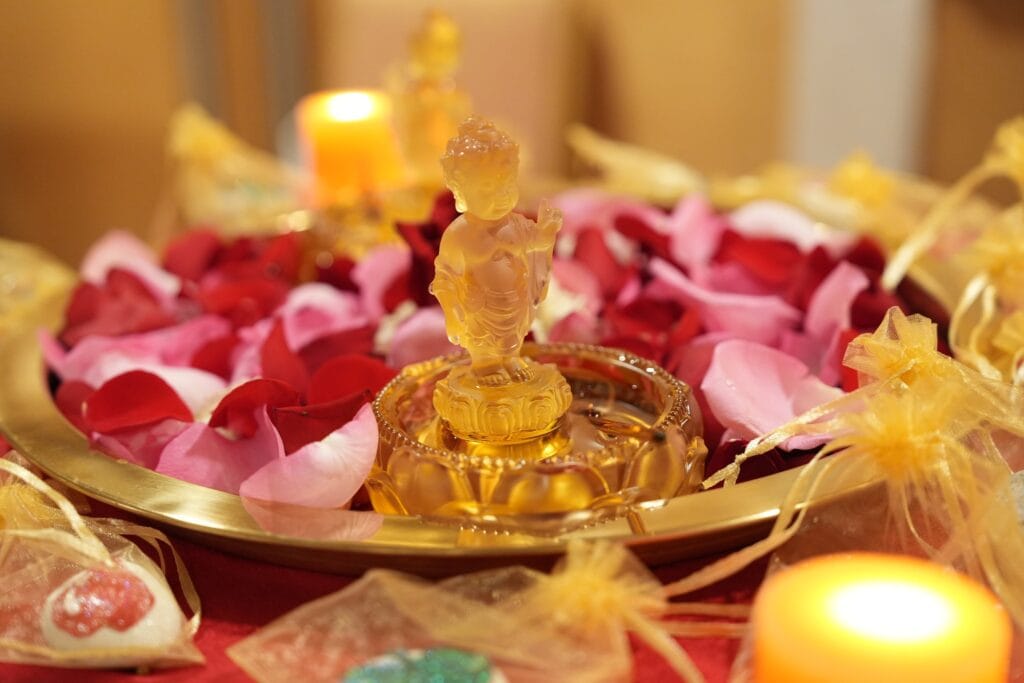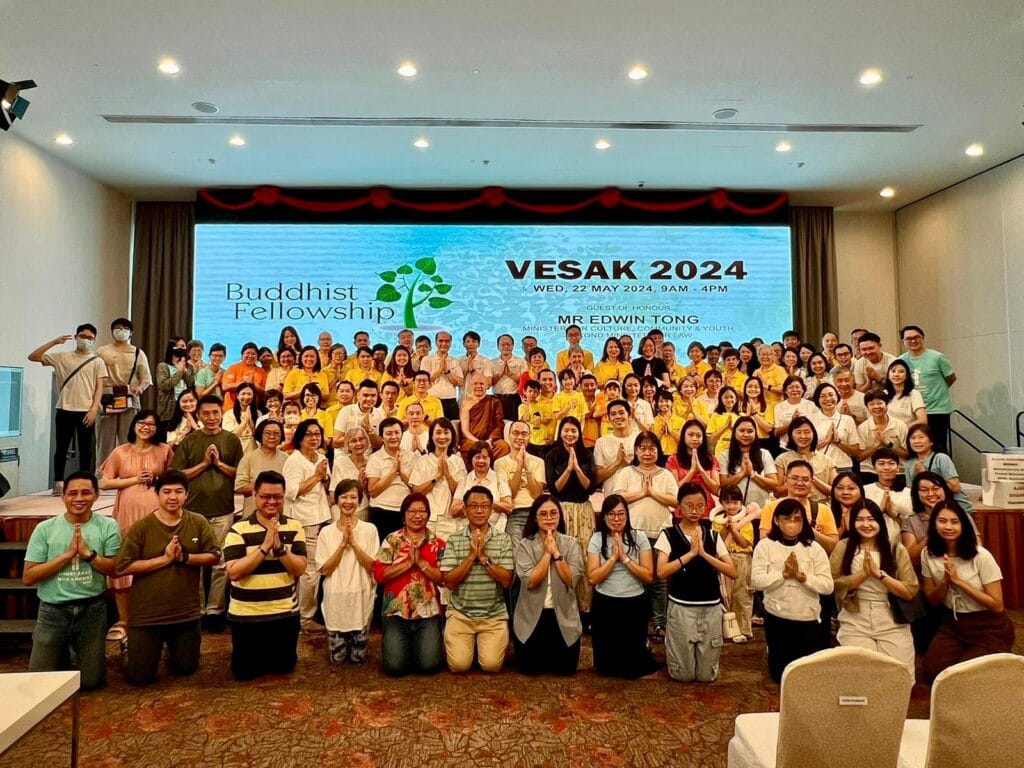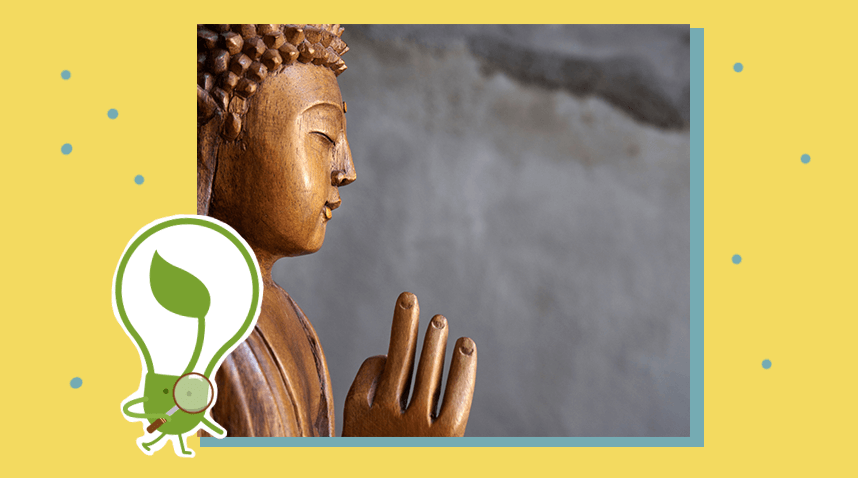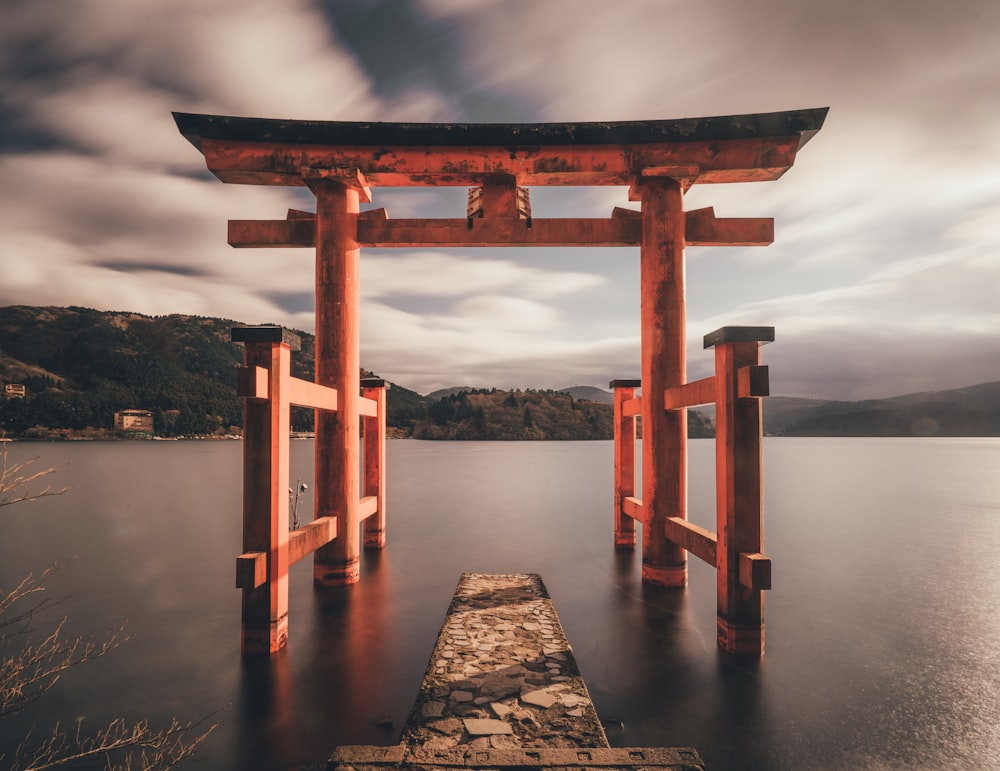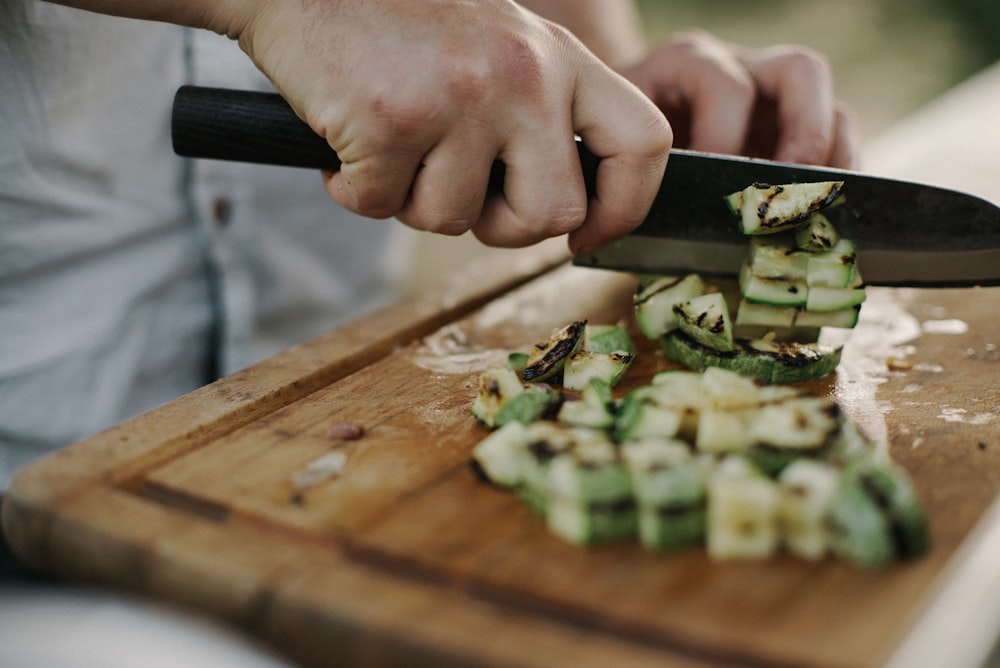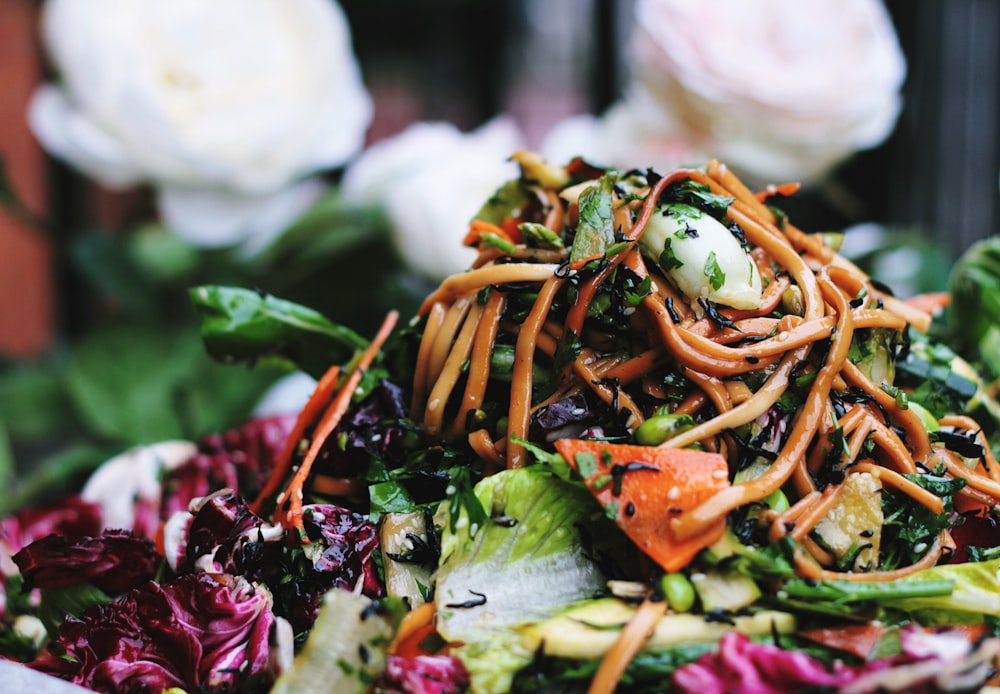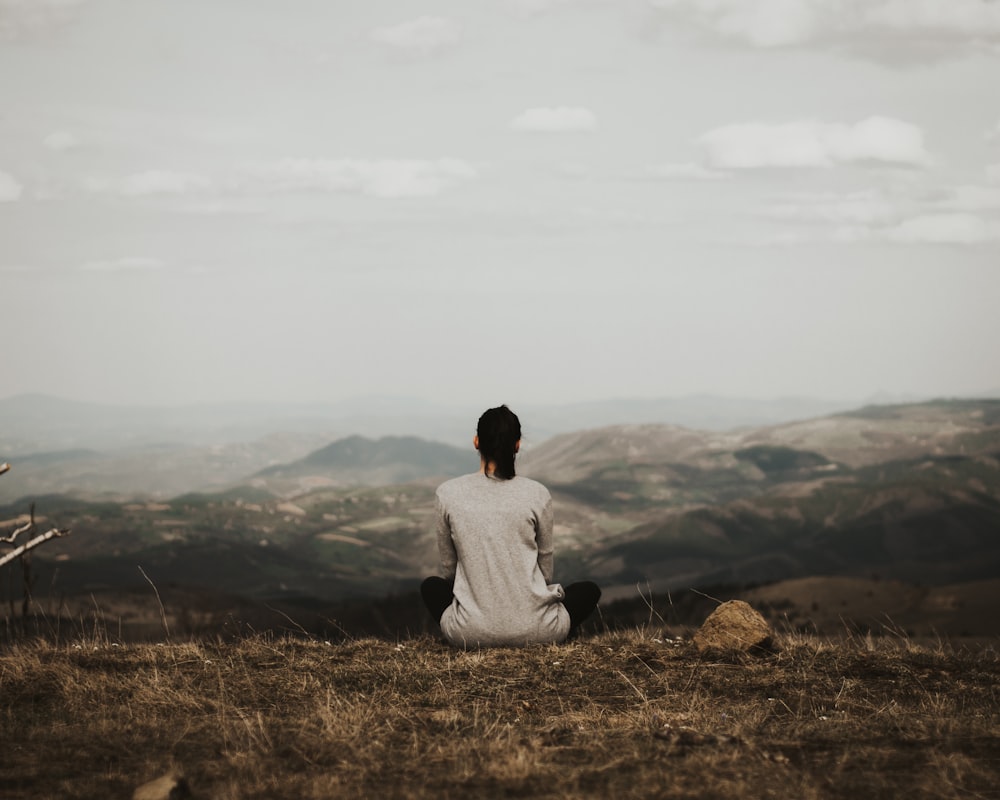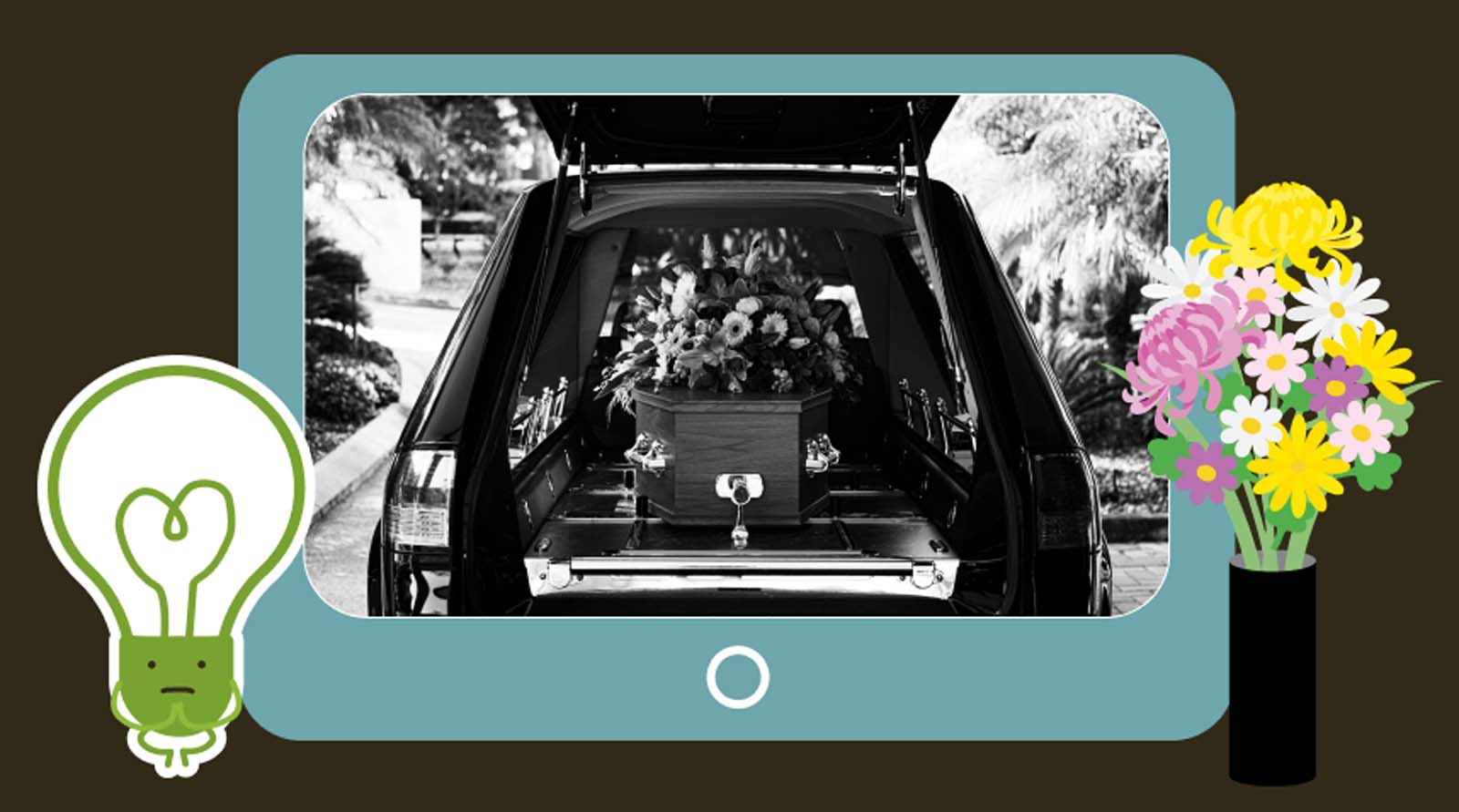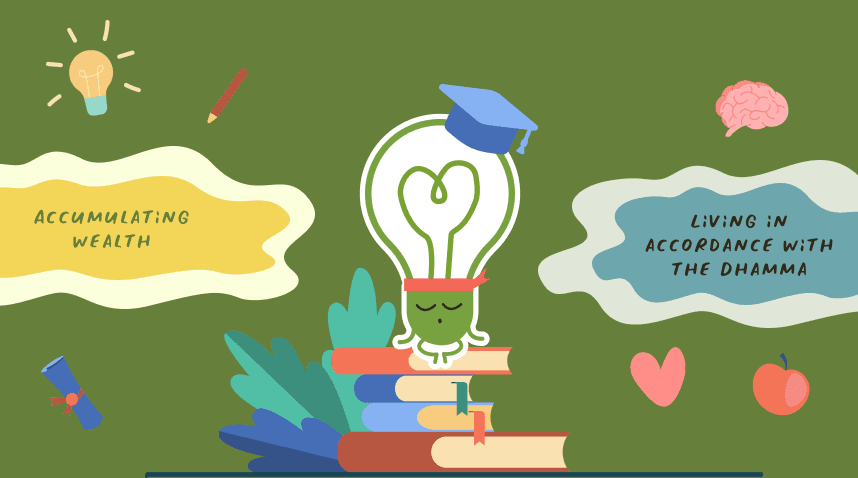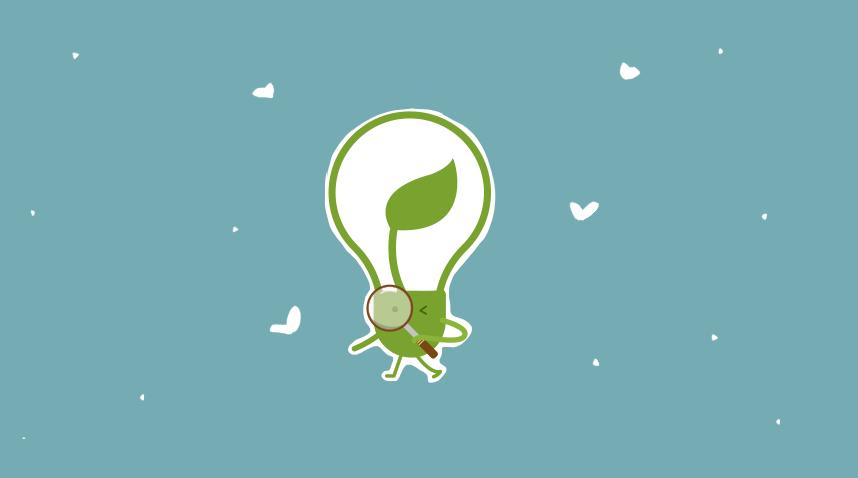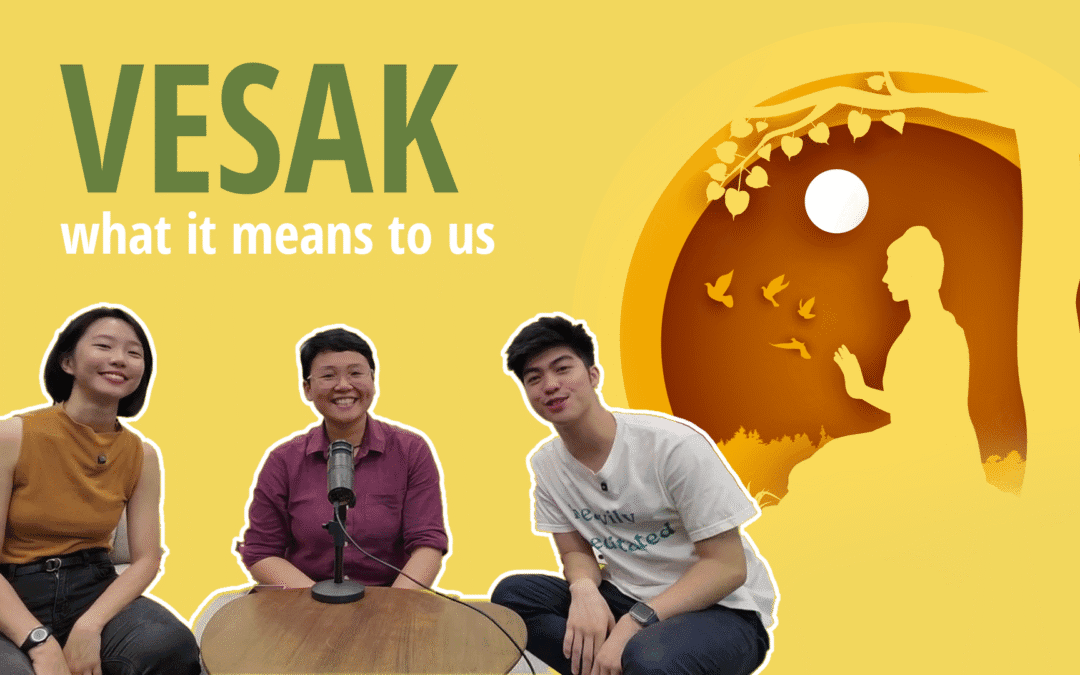
Ep 58: What Vesak Means to Us ft. Jiayi and Soon
Summary
In this heartfelt and humorous episode of the Handful of Leaves podcast, Cheryl, Jiayi, and Soon explore what Vesak means to them and how their understanding of Buddhism has evolved over time. From their childhood experiences of Vesak filled with rituals and free food to a more mature appreciation of the Dhamma, the hosts share personal stories of transformation, gratitude, and deepening practice. They reflect on how the historical Buddha’s life and teachings remain relevant today, emphasizing that Vesak is not just a holiday but a time to embody generosity, renunciation, and inner growth.
About the Speakers
👤 Hong Jiayi works in communications. She began her Dhamma journey last year, a path that has since become a grounding presence in her life. She volunteers with DAYWA, a community for young Buddhist working adults in Singapore, and serves as an editor on the podcast team at Handful of Leaves. Outside of work and Dhamma, she trains in Brazilian Jiu-Jitsu, a sport that keeps her humble, grounded, and occasionally squished.
👤 Teo Heng Soon (known as Soon in short) graduated from the University of Melbourne and is now a human capital consultant. Passionate about people, he has been a leader with multiple volunteer organisations like the Dyslexic Association of Singapore. Buddhist Fellowship Youth has been his Dhamma home for 12 years. Honing his leadership skills, he has learnt to give Dhamma talks and conduct workshops and sutta discussions. On a personal level, Soon is passionate about the arts – from Karate to Photography.
Key Takeaways
From Ritual to Meaningful Practice
All three hosts began their Buddhist journeys with ritualistic and often superficial connections to Vesak. Over time, their understanding matured into a deeper appreciation of the Buddha’s teachings and the symbolic meaning behind rituals like bathing the Buddha and offering flowers.
Vesak as a Celebration of Giving, Not Taking
Vesak marks a shift from self-centered wishes and offerings (e.g., praying for good grades or Wi-Fi) to embodying the Buddha’s spirit of selfless giving and renunciation. The day becomes a powerful reminder to let go of attachments and to serve the community with compassion.
The Best Offering Is Practice
While physical offerings are symbolic, the Buddha emphasized offering one’s practice—living ethically, meditating, and cultivating wisdom—as the highest form of devotion. Celebrating Vesak, therefore, becomes a chance to reflect on and renew one’s commitment to the Dhamma in daily life.
Transcript
Full Transcript
[00:00:00] Cheryl: A love for the Buddha and the sacrifice that he’s given,
[00:00:03] Jiayi: and a gratitude to his teachings. And also for the fact that his teachings from 2,500 years ago can still flourish in today’s world. That itself is also a celebration of its own.
[00:00:15] Cheryl: The Dhamma has transformed my life.
[00:00:18] Soon: The meaning of Vesak drastically changed. From taking to becoming a giver.
[00:00:23] Cheryl: Happiness is always defined as having more and more choice, but actually in the dynamic sense of way, happiness is really having the freedom from choice.
[00:00:37] Cheryl: Welcome to the Handful of Leaves podcasts where we bring you practical Buddhist wisdom for a happy life. My name is Cheryl.
[00:00:45] Jiayi: I’m Jiayi,
[00:00:46] Soon: and I am Soon,
[00:00:47] Cheryl: and today we’ll be talking about Vesak and what it means to us. So Soon, you have been in the Buddhist scene for a long time. Can you tell us exactly what your background is?
[00:00:58] Soon: Yeah, I’m like a 老鸟 (old-timer) but inside, still youthful. So I spent my entire life as a Buddhist or what we call a joss stick Buddhist, right. Going to the temple, burning some stuff, praying for good grades. I remember one of the years the GameBoy came out and I was praying for a GameBoy that when you press this button, a game would come out and change.
[00:01:21] Cheryl: Wow.
[00:01:21] Soon: So there was like Buddhism for most of my life. Then one day my brothers introduced the rest of my family, my parents as well to this place called Buddhist Fellowship, and that was when I started to learn more beyond the ritual. Right to the actual teachings, to the actual way of living. So I would say that I’m not really a 老鸟 (old-timer) in Buddhism. I’ve only been practicing Buddhist for about eight years now.
[00:01:46] Cheryl: So you are an evolved wishing tree Buddhist.
[00:01:49] Soon: Mm, yes.
[00:01:52] Cheryl: And what about yourself?
[00:01:55] Jiayi: I also a bit similar, like Soon I grew up being a joss stick Buddhist, always praying to the Buddha before my exams to help me pass it. And like competitions, please help me get a good medal. But only like last year where I started to learn a bit more about the teachings, and got a better understanding of Buddhism. Yeah.
[00:02:18] Cheryl: So you are the 临时抱佛脚?
[00:02:21] Jiayi: Yeah, totally me.
[00:02:23] Cheryl: So for those who don’t understand, yeah. That one is the last-minute-hug-Buddha’s-feet.
[00:02:33] Cheryl: And for myself, I have been a Buddhist for wow, maybe 10 plus years.
[00:02:39] Jiayi: Wow.
[00:02:39] Cheryl: And it was when I was very stressed during my exam periods and I just randomly went to a temple because they had free wifi and free aircon.
[00:02:51] Jiayi: No way. You did not.
[00:02:52] Cheryl: So I’m the cheapo (cheapskate) Buddhist.
[00:02:56] Cheryl: Okay. So tell me more. What was your first experiences of Vesak, if you remember?
[00:03:04] Soon: Mm. Well that we go back many, many years. I can’t really remember a specific Vesak, because I’ve been going for these events for a long time. But what I recall very vividly was coming to Vesak because there were a lot of pretty girls. Don’t tell my fiance that.
[00:03:25] Cheryl: Keep that, keep that in the edit.
[00:03:27] Soon: So, but I think what Vesak means to me, it’s your community or your friends, your family coming together for common good, which is living a good life, just as the Buddha had done. And when I was a kid, I remember training for a dance performance so that we could, you know, propagate Buddhism we would play songs, we will have activities like there’s this activity where you throw a ball and then if it hits the thing, you’ll go down. So we had all these fun activities.
[00:04:03] Cheryl: Oh, the dunking into the water one.
[00:04:05] Soon: Yes. Yes. So that was my childhood, like really just coming together with friends and just celebrating a good day right. In the eyes of what Buddha did and celebrating what he did, what he propagated, and how he lived.
[00:04:19] Cheryl: Mm. And do you find anything similar on your side?
[00:04:23] Jiayi: I didn’t really have that friends part ’cause I don’t celebrate Buddhism with friends. Right. But it has always been a family thing where every year during Vesak we would go to like Kong Meng San Phor Kark See Monastery and then we would do like three steps, one bow, and then maybe like bathing the Buddha.
[00:04:47] Jiayi: Yeah. And I think those, those activities like kind of bring the family together and make us like a bit happy on that day. Yeah. Just to celebrate the holiday. Yeah.
[00:04:58] Cheryl: Actually, my experience was a lot closer to Jiayi’s one where we also went to get all the very fragrant flower water from the 玉佛 (jade Buddha).
[00:05:09] Cheryl: And I would collect it and I would just shower the next day. ’cause it smells so good, right? Yeah. And of course the free food. But my experience was a lot more with my family, not so much with friends. And, yeah, I just remembering just not understanding anything, but just getting bags of fragrance smelling stuff.
[00:05:30] Jiayi: Mm. Steal the flower?
[00:05:33] Cheryl: No, no, no. They gave it to us, maybe. Yeah. Disclaimers. Disclaimers. Yeah. But so how do you tell your friends, you know, like over the public holiday when you go back to school, what do you tell your friends that, you know, what do you do over the weekend as a Buddhist?
[00:05:52] Jiayi: I say, I go 拜拜. Ah, yeah. Then maybe I’ll share that just to go for three steps one bow. But I don’t really know what it means. I don’t know why I’m doing it, but I just feel happy that I do it. Mm-hmm. So there’s no reasoning behind it. It is just like, oh, I’m doing just because.
[00:06:12] Soon: Mm-hmm. Yeah. Actually I quite agree with Jiayi as well. Your question kind of took me a step back. I was like, actually, yeah, we don’t really do a good job of sharing what Vesak is, what Buddhism is to our friends. So, because that never crossed my mind. We just take it as a public holiday, right? Just like, okay, yeah, I have some fun, go to carnival, raise some money, donate some food, and okay, next day back, back to normal.
[00:06:39] Cheryl: Yeah.
[00:06:40] Soon: Yeah. So I think that’s a really good question, Cheryl. Mm-hmm. Yeah.
[00:06:44] Cheryl: So it seems that in our Buddhist practice, we all have evolved. We have learned a lot more about the Dhamma. So at this point, how would you explain to your friends, or even your loved ones meaningfully, what does Vesak mean?
[00:06:59] Soon: I would say Vesak, it is really about coming together, to do a common good. So there’s so many things that you can do on Vesak Day. And when we start to discuss, talk and, and learn more, we realize there’s lessons behind the rituals. Mm. Right. The bathing of the Buddha. What does it mean? Offering of flowers, offering of incenses, you know, coming together to give food to the temple, to the monastic, or to do some charity work as well.
[00:07:30] Soon: All this meaning is to help us let go, is to renunciate, is to think less of ourselves because we give a lot of examples right. I came for girls. You came for free wifi, Jiayi was a bit more wholesome. Okay. I mean studies, right? So it’s this constant… Vesak… I think sometimes because of a lack of education or a lack of discussion, right?
[00:07:54] Soon: It becomes a day where sometimes we start taking. Like, oh, I wanna go to the temple because I want this. And I think as my practice has developed it’s less of what can the temple do for me, but more about what can I do for my community or friends, right? Bring people together, doing a common good. So I think that’s how the meaning of Vesak has has drastically changed: It’s from taking to becoming a giver, right?
[00:08:23] Soon: Spending time with your family, bring your family together, right? Doing something that’s wholesome and yeah, rituals will always be rituals, but. I think when we have the education, it just becomes a little more meaningful.
[00:08:38] Cheryl: Wow. Full score. A hundred mark. I give you.
[00:08:41] Jiayi: How do I continue from there? You said, you said everything perfectly.
[00:08:45] Cheryl: Exactly.
[00:08:47] Jiayi: Maybe to add on, I really agree with what you say. It’s not about taking but about giving. Right. And in that sense, we are also celebrating the qualities of the Buddha because his generosity, the historical Buddha, his generosity has been really, really great. He, after he attained enlightenment, he could have just retired, right?
[00:09:07] Jiayi: He has reached the pinnacle of life. He didn’t have to do anything and just bliss out. Until he passes away. But he chose to be a teacher for 45 years to go and walk the so many kilometers in ancient India, just to teach people. And when we recollect about that during Vesak, I think that can bring a lot of joy.
[00:09:31] Jiayi: Yeah. And a gratitude to his teachings and also for the fact that his teachings from 2,500 years ago can still flourish in today’s world. That itself is also a celebration of its own. So perhaps for Vesak now, it would be to remember the compassion, the resilience, the wisdom of the Buddha, and also celebrate all of those things with our friends and family.
[00:10:02] Cheryl: Mm-hmm. Yeah. Yeah. And let’s not forget that Vesak also is a commemoration of the Buddha’s life. His birth, specifically death and the passing away into Parinibanna. And I think as I grew in my Dhamma journey as well, what came from taking all the free stuff, evolved into really just a respect and, yeah, a love for the Buddha and the sacrifice that he’s given. And a reflection of how the Dhamma has transformed my life. Yeah, yeah. So on, on these days also, I make it a point to honor it the way the Buddha wanted, which is not — of course, you know, flowers, fragrances are all beautiful ways of offering our love — but the Buddha always wanted us to offer our practice. Yeah. So I always use these days as a day to intensify my determination to practice the eight precepts, and to practice, yeah, meditation, listening to talks and giving. It’s for sure ritualistic to a certain extent, but it’s also very beautiful in the purification of the mind.
[00:11:15] Jiayi: Yeah, sure. I did have a question. Maybe like eight precept can be seen as like, oh, you’re just adding extra hardship to your life. Life is already hard already. Why do you wanna take away entertainment from our life? But then why do you wanna do this? And why do you do this on Vesak Day? Why did the Buddha even give us restrictions in life. Why? Why are we celebrating the fact that he’s giving us restrictions? Oh shit. Sorry. Just playing devil’s advocate here.
[00:11:47] Cheryl: I think that’s a really good question, Jiayi. I think we have to go back to understanding the five precepts and the eight precepts. So the five precepts are non-negotiable by the Buddha, right?
[00:11:58] Cheryl: So die die, you have to hold onto it because those are the things that will protect you from going down to, I guess, lower states of mind, and lower states of even like realms, right, in the next rebirth. But when it comes to the extending three more precepts, which is no sexual conduct, no beautification, no entertainment, and no lying on high, luxurious, sleeping places.
[00:12:25] Cheryl: So for that, it’s really — sorry, one more. Right no eating. Oh, no eating after noon. And all of this is nothing to do with morality. Like it’s not immoral to eat at night, but it is more about the sense restraint. And the point of that is because the Buddha wants us to practice going against our likes and dislikes because in this world, there’s nothing that we can — we cannot get everything that we want. So the less we are attached to the things that we want, the less suffering we’ll have. So going against our craving by this method is really, you know, important for us time and time again. I’m actually not sure. Soon, do you know if the Buddha actually asked us to practice 8 precepts on Vesak?
[00:13:13] Soon: I don’t think so. Right. So the idea of practicing 8 precepts came about when people came to the Buddha. Mm-hmm. Because there were so many other religions during the half moon and the full moon day, they’re like, “wow, Buddha, look at them. They’re like, doing something extra. How about us?”
[00:13:32] Soon: So there was actually no meaning to those days. And then Buddha was like, okay, yeah, let’s give meaning. Right. Giving meaning is important as well. So he is like, okay, yeah, this is a time where you can intensify your practice. Instead of five precepts, you can do eight precepts. For some people that follow the Chinese Buddhist way of doing things, they eat vegetarian on those days.
[00:13:55] Soon: So once again, it’s a day of wholesomeness. And Jiayi, to answer your question, why do we have more restrictions in our life? I think that goes back to the idea of how the material world works, where whatever is comfortable is good for us. Whatever’s uncomfortable is bad for us. But is it really the case?
[00:14:17] Soon: You know, I was reading a study done by IMH in Singapore and almost one third of 15 to 35 year olds in Singapore are feeling more empty. They’re feeling more tense. There’s all these negative feelings, and one of the reasons is social media.
[00:14:35] Cheryl: Mm-hmm.
[00:14:36] Soon: And what social media does for us is at any time I can get a dopamine hit. Right. And that’s comfortable. Like, I just wanna break, I just wanna relax. Okay. Swipe, swipe, swipe. But is it really good for us in the long run? Mm-hmm. So there is benefit to restraining our sensors, there is benefit to restraining what we do. And all these things have actually long-term benefits.
[00:15:02] Soon: Mm-hmm. So for example, right, when we, a lot of people think, wow, buddhism is like sitting on a hill side, you know, where it’s peaceful and like, “Om”. But when we practice it in our day to day lives, if we are mindful day to day, moment to moment, we become better people. We are more aware of what goes through our mind and when we are more aware of what goes through our mind, we are more aware of what comes out. Right. Body, speech. So restraint is beneficial. Especially once again, once you understand the reason behind the ritual.
[00:15:43] Cheryl: And a lot of times in our modern society, I think happiness is always defined as having more and more choices. You get to, you know, get what you choose, but actually in the dynamic sense of way, happiness is really having the freedom from choice.
[00:15:59] Soon: Wow, beautiful, beautiful.
[00:16:01] Cheryl: Where you are free from your likes and dislikes and you can still be content and happy, whatever it is. Yeah.
[00:16:08] Jiayi: Wow. That’s beautiful.
[00:16:14] Soon: No, I actually completely agree with that. You know how I talk about how when we didn’t have a good understanding of Buddhism, we came in as takers. Wifi, so on, so forth.
[00:16:25] Cheryl: You’re never gonna let it go ah?
[00:16:29] Soon: But then once we start understanding the true Buddhism, we start to let go. And one of the things I let go of over the years is strong opinions. I will get into fights. I would talk people down. I even made someone cry. Yeah.
[00:16:47] Jiayi: How could you?
[00:16:48] Soon: I know, right? So I was very sharp with my words. And I think what the Dhamma, what Buddhism has taught me was to let go of those views. And because I can let go of these views, I can have different conversations with people from different faiths, different perspectives, and I can still treat them as a human being that I care about.
[00:17:10] Soon: So I think that’s, to me, the idea about renunciation once again. It’s really about letting go of this, “I am important. My views all matter”, right? Because when you lead a life that is so focused on me, me, me, me, me and I, there’s a lot more suffering. Yeah.
[00:17:28] Cheryl: Nice. So I guess, you know, the question then is with these reflections that we have, you know, that Vesak sparks in us, yeah, how do we, or how do you bring that into your daily life? How does this spirit of Vesak, right, like to put it in a weird way, manifest in your everyday life throughout the year. And yeah. I’m also curious to hear from you, yeah, like for example, in renunciation, can you share an example of how do you continue to let go, in your daily life and in the 364 days, other than Vesak?
[00:18:05] Soon: So I think that’s a beautiful question, Cheryl. The reason why there’s always a lot of emphasis on that specific day, right? It’s like any anniversary, any Valentine’s also. Yeah. Any birthday. Yes, there is importance in those specific days, but I’d rather treat my partner, my parents, my siblings, consistently good.
[00:18:28] Soon: And I think that’s how the mindset they can bring to the practice as well. It’s not just a day of holiness. Mm-hmm. And after that, we go back to it being a normal person, doing the negative things again. And I think the essence of Vesak, at least to me, it’s coming together with a community to do good together.
[00:18:48] Soon: And I think how that can manifest in a day to day life where we talk about renunciation, letting go, it’s when you have so many views already and assumptions that you make about the world, it’s very hard to talk to you as a person. Right. If I am a clean slate, if I say, “okay, there’s no me, there’s no I, that’s not mine”, when you share a problem with me, Cheryl, I won’t have all these judgements in my head. “Oh, you should have done this”, or “You should have done that.” “Oh, you shouldn’t do that.” ‘Cause a lot of times when people come to us with problems, we always, “okay, I know what to do, it’s too easy. I can solve this.”
[00:19:25] Soon: But when you come with a mindset of “I’m not a taker, I’m a giver. I’m gonna give space, I’m gonna give my energy, I’m gonna give my presence to you.”, that’s us letting go of our self-importance. So we always think of these Buddhism stuff as like the big things like Nibanna, or like I need to go to a meditation retreat then I can be good. Those are helpful. But all these small things that we do in our day-to-day life create a bigger condition for us to go on to do bigger things.
[00:19:59] Soon: For our practice, for our community of friends. So I think that’s how I see Vesak in my day-to-day life. If I am practicing the Dhamma, well, if every day is a hundred percent, how many percent is spent with wholesome thoughts, with wholesome actions? And how many percent is with unwholesome acts and unwholesome actions, sorry, with unwholesome acts and unwholesome thoughts. It’s that simple. We don’t have to theorize it. We don’t have to make it so difficult.
[00:20:31] Cheryl: And that’s the most important check and balance that we need to take care of every single day.
[00:20:35] Soon: Yeah,
[00:20:35] Cheryl: yeah. Thank you so much for sharing.
[00:20:38] Soon: No worries.
[00:20:39] Jiayi: I think I don’t have such a… my answer might be more superficial. For at least before I started practicing, I’m still quite a new Buddhist, right? But before I started practicing, I just saw Vesak as a day… oh, Buddha came into the world. Oh, Buddha got enlightened, which I don’t know, I don’t actually know what it meant. Okay. Yeah. Shower Buddha. Yeah. Fun. Oh, 三步一拜, oh, okay. Budha very great. Right? So I just, yes. Respect. But after learning a bit more about Buddhism, the life of the historical Buddha, the things he taught, you develop gratitude.
[00:21:22] Jiayi: I developed gratitude to his teachings, because it has helped me through times of difficulty. It has helped me to shift the way I see the world in a more skillful way, which means that I actually feel more happy in general. And with that gratitude, right? I think it’s also a good recollection object that I can have in daily life where when I’m having a bad day, oh, this person la, that person la, why I’m upset with myself. Then I will always remind myself that actually the Buddha had faith in all of us that we could attain enlightenment. Yeah. And that’s why he went to teach. Or else he teach for what? Yeah, he teach for what? If you cannot do it. He teach for what? But he’s so smart, right? So that’s why he go and teach. He know that we all got potential to be happy in life.
[00:22:14] Soon: Yeah.
[00:22:14] Jiayi: And that’s why he went to teach. And when I’m feeling upset, I’m feeling down, I think of that. Then be like, yes. ’cause Buddha said, so I’ll keep trying. I will not give up in the practice.
[00:22:25] Jiayi: Yeah. So I think that’s why
[00:22:26] Cheryl: you’ve got this,
[00:22:27] Jiayi: you’ve got this, right. You’re good enough. You’ve got this girl, you’ve got this. Yeah. So, I guess those gratitude, that faith the Buddha had in us and my faith in the Buddha helps me to continue to practice in daily life.
[00:22:42] Soon: Yeah, I don’t think your answer is any more superficial at all.
[00:22:48] Jiayi: Thank you. Cut that out then.
[00:22:52] Soon: Yeah. I don’t think your answer is superficial at all. I think faith is such an important thing and I think as people start being more logical, more scientific, we kind of lose that faith, right? That confidence in the Buddha’s teachings. Sometimes too much doubt as well leads us to analysis paralysis.
[00:23:09] Soon: Oh, what if this happened? What if Buddha didn’t exist? What if Buddha didn’t actually do this? It prevents us from acting and just trying. Right. Taking a leap of confidence and to test, oh yeah, Buddha said this. Let me investigate a bit more. And I think what you said, right, I think the beautiful thing to me about Buddhism is that Buddha believed in the human potential. We can do it. Yeah, we can do it. Right. Like it’s about not entirely relying on anything external. We are enough.
[00:23:44] Jiayi: So beautiful.
[00:23:44] Soon: You’re enough.
[00:23:46] Jiayi: You’re so beautiful. You’re good enough.
[00:23:50] Cheryl: And then the Buddha showed us the beauty of realizing the highest potential a human can ever realize to be free from greed, hatred and delusion. And what’s left is just pure unadulterated Metta (loving-kindness) and compassion.
[00:24:03] Soon: Beautiful.
[00:24:04] Jiayi: Aw. That warms the cockles of my heart.
[00:24:10] Cheryl: Aw. So I’m also just, again, very curious, right. Knowing what you know now, what do you wish you had known when you first encountered Vesak?
[00:24:21] Jiayi: I think, I wish I knew more context of the historical Buddha. And, I guess it’s also like, I wish I practiced earlier because, I only started practicing properly, right? Like last year. So I’m 26. I’m turning 26 this year. For the first 20 plus years of my life, just heeheehaha.
[00:24:47] Cheryl: Yeah.
[00:24:47] Jiayi: I just dunno what I’m doing. Like I’m Buddhist, but I dunno what I’m doing. And with that, like you start to cultivate all the different habits that come from your ignorance, right?
[00:25:00] Jiayi: And we go to Vesak, but you don’t know, don’t really know what it means. But now, actually this year will be my first Vesak as a like more practitioner, practitioner person. Practitioner. Yes. It’s my first year as a practitioner celebrating Vesak. I think the difference this year would be when I see like the Buddha statue, I cultivate more gratitude. When I offer flowers, I actually know what I’m doing. I know what it means. I’m not actually offering the flower to a godly Buddha who will receive the flowers from the heavenly realm. That’s not what’s happening. It’s actually to reflect on his teachings. And, if I knew all of this earlier, perhaps there’ll be greater appreciation of what this day actually means.
[00:25:53] Cheryl: The flower you offer for what?
[00:25:56] Jiayi: Because flower nice ma, you Valentine’s, you buy flower to a girlfriend. You’re not offering the flower to a girlfriend to recollect impermanence right. And yeah, so like flowers is like a nice gift and maybe it’s like a nice gift to the Buddha as well.
[00:26:10] Jiayi: But now we also know the best offering is our own practice, which is kind of like invincible, right? But yeah, so offering flowers also, it is great you do that, but the best one is still to offer your meditation, your generosity, your cultivation of wisdom, et cetera. Yeah.
[00:26:33] Cheryl: Yeah.
[00:26:33] Jiayi: What about you, Soon?
[00:26:35] Soon: I completely agree with the idea about context. I think whenever we talk about faith, that’s this story that has stuck in my mind is about Buddha with his supreme eye. He saw that there was this one person in a distant village, many kilometers away. He said, this person is ready to hear the Dhamma, and he trekked all the way hundreds of kilometers.
[00:26:59] Cheryl: Ah. He didn’t fly there.
[00:27:01] Jiayi: He got no supreme wings.
[00:27:04] Soon: He trekked all the way to go to that village just to speak to that one person because they were ready and willing to listen.
[00:27:10] Jiayi: During that time, there was no bus, no MRT. They don’t wear shoes also. Yeah. No shoes, right? I dunno. Okay. Sorry. Sorry. Take that out.
[00:27:18] Cheryl: That’s fine. It’s fine.
[00:27:19] Jiayi: But no airplane. No, no bus, no eZ-link card.
[00:27:22] Cheryl: And it’s India, so the road is like next level one.
[00:27:26] Soon: Yeah. They just went on pilgrimage so they would know better. Yeah. So, wow. Like who would do that? Right? To put your physical and possibly mental, as a normal person right, stakes at risk just to help that one person.
[00:27:43] Cheryl: Mm-hmm.
[00:27:44] Soon: And I think when I heard about that story, the sacrifices that Buddha has gone through, I’m just, wow. Yeah. Like just saying now also makes me feel emotional, because of the compassion he had, because he wanted to help those with little dust in their eyes, those who are ready and willing to listen.
[00:28:02] Soon: And I think this also speaks about what Buddhism is, right? We, we are not here to make everyone Buddhist. We are here to speak to those who are ready to listen. Who are willing to have a chat to find out more. And I think that’s the spirit of, at least for me, being a Buddhist, is that investigative spirit, that spirit of questioning and trying to find what truth is.
[00:28:28] Soon: Mm-hmm. Yeah. So I think having a little more context when I was younger, I would’ve appreciated more. I think, a similar example is sometimes, our parents say, “Hey. Be nicer to your grandparents.” You know, you’re just like, “Huh but why? They’re old people.” Right? Like, I used to fight so many times with my grandma, but if only I heard a little more about how she lived her life, how she sacrificed her youth, you know, to raise my mom, i would appreciate them more. So I think it’s going back to, you know, what stories are we telling our friends about what Vesak is?
[00:29:09] Cheryl: Mm.
[00:29:09] Soon: About who Buddha is. Is he a guy that just flies around or is he someone that really cares about those who are ready to listen, ready to practice? Mm-hmm. Yeah.
[00:29:22] Jiayi: How about you, Cheryl?
[00:29:24] Jiayi: Arrow.
[00:29:25] Cheryl: Yeah. But, but thanks so much for humanizing the Buddha and reminding us, yeah. Reminding us that, you know, there is so much behind the rituals that we do and really remembering the significance of that as well. I wish I knew the Buddha more than just a statue. Yeah. So, so I wish I understood him more as a human being.
[00:29:51] Cheryl: Yeah, because my understanding of the Buddha for a long, long, long time until recently, was that he’s just this really, really, really, really zai person. It’s like way beyond my human abilities kind of vibes, you know? But if I was to understand him that he had his struggles. Yeah. He even got married, had a kid, he had to suffer with backache.
[00:30:11] Cheryl: You know, like if I could relate to him in that way, I think, yeah, the Buddha would’ve come way more alive, yeah. Yeah. Yeah. So this, that’s my take. Yeah.
[00:30:23] Jiayi: That’s beautiful. That’s beautiful. Wow. Imagine like your cousin. Yeah. Or like your, I don’t know, your uncle who got married. Then just left the house and then came back as the enlightened one.
[00:30:37] Jiayi: Wow. And then it’s like, you could imagine him as like your best friend. ’cause he’s the nicest person on the earth. On the world. In the world. But he’s also like a super wise person. So when you’re like, oh, struggling with work, you hate this person. Yeah. Talk to him. You’re like, oh my God, I feel so much better talking to you. Yeah. Yeah.
[00:30:55] Soon: He just puts his hand on you and
[00:30:57] Jiayi: Oh, you’re like, oh.
[00:30:57] Soon: I’m at peace I let go now. That’s not me. There’s no I. That’s not mine.
[00:31:04] Cheryl: And occasionally he’ll say, you’re foolish person. Stop with your bull. I never say that.
[00:31:15] Cheryl: Okay. So I think, maybe to end this episode, what is your aspiration for Vesak this year? Awkward silence group.
[00:31:36] Soon: I think that’s the toughest question yet. Yeah. Still thinking.
[00:31:39] Cheryl: Okay. Mine will be very simple, so I’ll share first. I’m starting to look at all the days as the same. You know, every day is just the same in that sense that I wish that I will continue to put in the efforts and conditions to make my wholesome qualities increase and my unwholesome qualities reduce, and to keep doing that in every life until, yeah, one day I’m purified in my mind, body and speech too.
[00:32:06] Jiayi: Yeah. Nice. Okay. Actually then that reminds me, I remember last year, 31st December to first January, everyone will be celebrating. Oh, happy end of 2024. Let’s welcome a new 2025. And it’s like a big thing, right? Every year, new year is a big thing, but actually it’s also just a human construct.
[00:32:25] Cheryl: Mm-hmm.
[00:32:26] Jiayi: It’s just like how we perceive the day, but the day is actually no other different than any other day. Vesak itself could also be seen that way. It’s a human construct, but why is this human construct important? It reminds us of the qualities of why we’re practicing Buddhism, of why Buddhism is important in this world, and, to link, okay, to link back to the aspiration of Vesak this year, I guess it’s to keep going in a practice.
[00:32:59] Jiayi: We are going against our instincts, right? We are so used to holding onto our views, our likes. I love like fried chicken or whatever, but then learning to see that, oh, I really hate this person. But learning to see, okay, this is not… holding onto these things are not beneficial for me in the long run. The Buddha taught the way to really make me feel happy and contented in daily life. And with Vesak, I get reminded of that more strongly and it helps me to not give up on a practice even when times are difficult. And, to remind the purpose of what I’m doing, why I am doing things.
[00:33:46] Soon: So to me. It’s a little blend of both of yours. Vesak, it’s a new start, right? And I think it’s a new start for me to go deeper, just show up better as a human being for myself. How can I be compassionate to myself? How can I show up better for my partner? How can I show up better for my family, for my community?
[00:34:14] Soon: How can I let go more and more of my views? What should be or should not be. And also aim towards creating conditions for more wholesome encounters in my life. And when I face unwholesome encounters how can I let those go as well? So I think that that’s my aspiration for this Vesak, is kind of to keep the good fight going. Mm.
[00:34:40] Cheryl: And thank you so much. I’ve learned a lot from both of you. And it’s given my Vesak a new meaning as well. Please feel free to comment below what does Vesak mean to you? And yeah, stay tuned and see you in the next episode. Thank you, and bye bye. Bye-bye bye.
Resources
The Snake Simile where the Buddha calls someone foolish —https://www.accesstoinsight.org/tipitaka/mn/mn.022.nypo.html#:~:text=6.%20%22Of%20whom,time.%22%5B3%5D
Special thanks to our sponsors:
Buddhist Youth Network, Lim Soon Kiat, Alvin Chan, Tan Key Seng, Soh Hwee Hoon, Geraldine Tay, Venerable You Guang, Wilson Ng, Diga, Joyce, Tan Jia Yee, Joanne, Suñña, Shuo Mei, Arif, Bernice, Wee Teck, Andrew Yam, Kan Rong Hui, Wei Li Quek, Shirley Shen, Ezra, Joanne Chan, Hsien Li Siaw, Gillian Ang, Wang Shiow Mei, Ong Chye Chye, Melvin, Yoke Kuen, Nai Kai Lee, Amelia Toh, Hannah Law, Shin Hui Chong
Editor of this episode:
Aparajita Ghose
Website: aparajitayoga.com
Transcriber of this episode:
Tan Si Jing, Bernice Bay
Visual and Sound Effects
Anton Thorne, Tan Pei Shan, Ang You Shan

